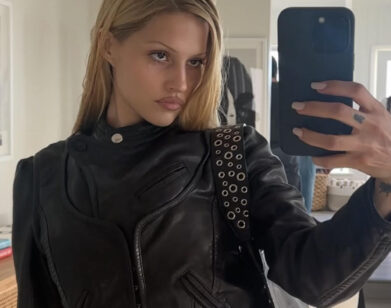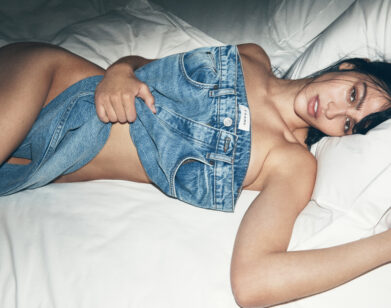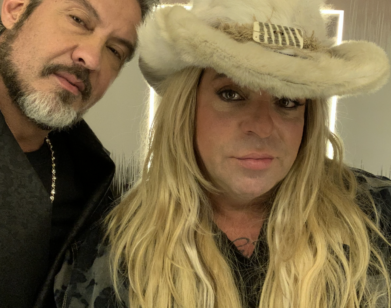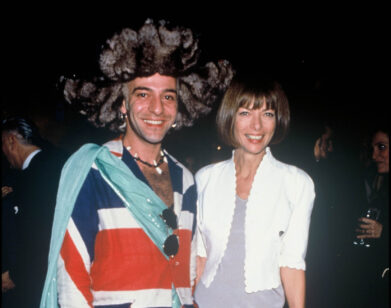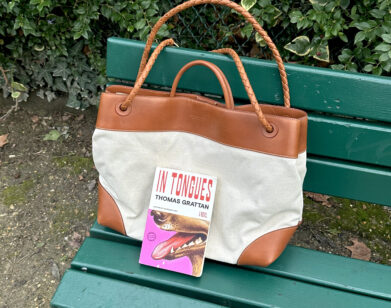Tamara Mellon
It’s been 14 years since Tamara Mellon, then an accessories editor at British Vogue, first partnered with a bespoke London shoemaker named Jimmy Choo in what would prove to become a watershed moment in the history of footwear, transforming every woman’s love affair with expensive stilettos into the creation of a global empire. Since then, the Jimmy Choo brand has gone on to infiltrate popular culture on a mass scale, becoming synonymous with a kind of feminine luxury lifestyle that Mellon herself—strong, smart, independent, and glamorously larger than life—has come to personify.
Mellon’s business savvy is well-documented: She was among the first to bring designer shoes to the red carpet at a time when dressing celebrities was still a new concept, and she set up camp in a hotel room before the 1999 Oscars for fittings. In 2001, Choo sold his 51 percent stake in the business.
Nevertheless, demand for the shoes only increased. Over the last several years, Mellon has driven not only the growth of the brand, overseeing collaborations with H&M, Hunter, and Ugg, among others, but also its creative development, and took an active role in the design aspects of Jimmy Choo’s shoe and accessories lines, as well as forays into new areas, including the launch of a fragrance.
Despite the success of the Jimmy Choo brand, there have been some bumps along the way. In 2004, Mellon’s father, Tom Yeardye, died suddenly after having a brain aneurysm, and the following year, she and her husband Matthew Mellon, scion of the Pittsburgh banking family, ended their marriage after a messy divorce. Three years ago, Mellon had to negotiate an internal battle, wrestling control of Jimmy Choo from her then CEO, Robert Bensoussan, who had tried to sell the company out from under her. The tabloids have feasted on the particulars of her love life—she’s been romantically linked to both Kid Rock and Christian Slater. Most recently, she went head to head with her mother, Ann Yeardye, a former Chanel model, over the rights to several million dollars’ worth of Jimmy Choo shares, which Mellon claimed had been mistakenly deposited in her mother’s trust. After a two-year court battle, the dispute was resolved last fall, with the shares being awarded to Mellon.
Last year, Mellon relocated from London to New York City, moving into a brownstone on the Upper East Side with her daughter Minty. She has, though, emerged from the tumult of the last several years with her resolve intact—and is ready for a much needed period of calm.
CAMILLA JOHNSON-HILL: I’ve been going through all of these articles about you—there’s like 50 of them—and the Tamara in those articles is very different from the Tamara I know, who is a successful businesswoman, but also very funny and charismatic and much more down to earth.
TAMARA MELLON: That’s because the journalists normally come in with a preconceived idea about what I’m like. They have all these assumptions that aren’t accurate. They want this fantasy of this sort of tough businesswoman, red-carpet thing. That’s the story they want.
JOHNSON-HILL: One thing that doesn’t seem to get written about much is that you’ve got a huge mound of fashion credentials. You really paid your dues before you started Jimmy Choo. You’ve always loved fashion.
MELLON: Of course. I mean, at 16, I was wearing leather Azzedine Alaïa at boarding school. [laughs] I was at a boarding school in Switzerland and the other girls looked at me like, “What the hell is that?” I was obsessed with it. And when you say I’ve really paid my dues, you’re so right. I worked on the shop floor in Browns selling Alaïa. I actually spent more in Browns than I earned—I left there in debt. But I’ve worked in a PR company. I worked for Caroline Baker at Mirabella. I worked for Sarajane Hoare, who is a legend, at British Vogue, doing shoots with photographers like Mario Testino. But these writers forget about that stuff.
JOHNSON-HILL: Do you see yourself today as more of a creative person or a businesswoman?
MELLON: Well, I cross. It’s very rare that you find someone who walks both paths. Today, I’m more focused on the creative, but the big mistake I made early on was in not understanding what different titles mean.
JOHNSON-HILL: What titles do you give yourself?
MELLON: Today, I’m called the founder and the president, but that doesn’t accurately reflect what I do. I should probably change my title to artistic director because that’s what I really do. I’m focused more on product and bringing in interesting collaborations.
JOHNSON-HILL: I was going to ask about that because there have been a whole string of collaborations recently, haven’t there? There’s the one with Hunter, the one with H&M, and then the one for Uggs. How do those collaborations work for the brand? Because there could be an argument that H&M, for example, gains more than you do from it.
MELLON: I think that because of the economic environment, the timing of the H&M collaboration was perfect. Everybody needed a morale boost. With H&M, because what we did was available for such a limited amount of time, I don’t think it diluted the brand at all. I created a whole Jimmy Choo woman for them: the clothes, the jewelry, the whole look. With Ugg, we’ve taken the traditional boot and just decorated it. So we’ve put the DNA of Jimmy Choo in the details.
JOHNSON-HILL: When I heard about the Ugg collaboration, I couldn’t see how the Jimmy Choo spirit could get onto the Ugg. Do you think that Ugg could potentially be sort of old news or do you think it’s still relevant?
MELLON: I think Ugg is still relevant. The thing about Ugg is that everybody has a pair in their closet.
JOHNSON-HILL: I don’t have a pair.
MELLON: I bet you’ll wear the Jimmy Choo ones! The thing about Uggs is that they’re so comfortable. Once you’ve worn them, you don’t want to go back.
JOHNSON-HILL: I feel like there’s been a real shift in the past couple of years with Jimmy Choo as the designs have become much more fashion-conscious.
MELLON: That’s something I did in a very conscious way because when I started Jimmy Choo, that’s what we were about. But two years ago, I restructured management because there was an internal conflict. I wanted to innovate all the time. So I restructured with new people who supported my vision rather than sabotaged it, and that’s why you saw such a dramatic change.
JOHNSON-HILL: Do you think that’s been a successful transition, then?
MELLON: Yes. The business has been phenomenal, even during the economic crisis.
JOHNSON-HILL: Where do you get your business savvy from?
MELLON: I think it’s instinct. Everything I do is just really my intuition, and every time I go against my intuition, it’s a mistake. Even though I may sit down and analyze and intellectualize something on paper, if I go against my gut feeling, it’s wrong.
JOHNSON-HILL: I’ve seen your closet and it’s pretty impressive. I reckon your wardrobe must tell such an incredible story.
MELLON: Well, you know, my closet goes back to the mid-’80s, when I really started buying stuff. I was wearing Azzedine Alaïa, and then there was a Vivienne Westwood phase, and then there was . . . do you remember that guy? He made pieces out of what looked like curtain material. It was huge at the time—the trousers looked like curtain material and everyone was wearing it. It sort of went from denim cutoff shorts and cowboy boots into like, into that phase, which sort of crossed over with biker shorts and D.M.s [Doc Martens].
JOHNSON-HILL: You wore D.M.s?
MELLON: I wore D.M.s with cycling shorts. Do you remember that look? Then there was the whole hip-hop phase. It was all about wearing sneakers.
JOHNSON-HILL: We were talking the other day, and I said, “And now you’re the powerhouse behind the biggest shoe brand in the world. . . .” But you said that you don’t see yourself like that. How do you see yourself?
MELLON: I don’t really understand what the public perception of me is. I think public perception and reality are two wholly different things.
JOHNSON-HILL: I remember your telling me once how there was an article that came out and it was about the “golden couple,” and it was about you and your ex-husband. The article had just come out and you were going, “Isn’t this such an irony because there is the public perception of me as part of this golden couple, and I’m actually having a really hard time within my relationship.”
MELLON: Well, it goes back to that thing where they want to write about a fantasy rather than reality. The reality is that I spent years in the factories in Italy when I first set up Jimmy Choo. Today everyone who has a job at Jimmy Choo, I’ve done their job—right down to the cleaner.
JOHNSON-HILL: What was your motivation to do all that back then?
MELLON: Independence.
JOHNSON-HILL: Independence from what?
MELLON: Independence from a very dysfunctional family.
JOHNSON-HILL: So you were totally driven by creating something that would become your own and be your baby.
MELLON: Yes, it was almost like buying my freedom.
JOHNSON-HILL: Well, what motivates you now?
MELLON: There were two things that motivated me then: independence, and passion about what I was doing. And those are still the things that motivate me now. I still have that passion for creating a product. And I will never be dependent on a man. I will never be dependent on a husband or a boyfriend or a father. That’s one thing that’s really important to me.
JOHNSON-HILL: But at this point, I would presume that you’ve probably got enough money that you are independent and you could kind of slow down on the work if you chose to. But you haven’t. Do you still feel like there is something to prove? Is there still kind of a need to take it further?
MELLON: I think there is—particularly when you come from like a really dysfunctional family where you’re always told that you’re not good enough and no matter what you do, you’re still criticized. You know, I went through a court case with my mother who is delusional and lied about me. So I guess even in the face of my success, I still can’t get the approval. So I’m still fighting for approval.
JOHNSON-HILL: And that gives you a kind of drive to carry on, to prove to yourself—
MELLON: That they’re wrong.
JOHNSON-HILL: Within this bunch of articles I was reading, there really were so many about the court case with your mother. It must be hideous to have that kind of thing scrutinized.
MELLON: Yeah, it is. The last few years have been really challenging. It’s very difficult for people to understand mental illness. That’s actually why I’m starting to work with a charity called Providence Projects, which is for people who have mental illness in the family.
JOHNSON-HILL: Not to get into a therapy session here, but when these things are going on in your life, how do you deal with them? Do they affect your work? Or do you just kind of get into your work function, and everything carries on?
MELLON: I suppose I can get into work function, but then it damages everything else in your life because you kind of shut down in trauma. But I think the next few years are going to be amazing because I’m free from a lot of dirt. I feel like that kind of stuff does stop you from functioning at your full potential. It’s like getting into a boxing ring with your hands tied behind your back. But now I’ve cleared out a lot of the wreckage from the past. I think, in the next few years, people will be able to see me functioning at my full potential—personally as well as professionally. I had my therapist with me during the trial because it was sobering to deal with the dishonesty and the betrayal, and he actually sat in a room with my mother at one point and came out of the room and said, “Tamara, I can tell you what is wrong. Your mother is a sociopath—that is what you’ve been dealing with.” And then, when I looked up the definition of a sociopath, it all made sense—all of her behavior.
JOHNSON-HILL: And it was your father who was kind of the glue that held everything together.
MELLON: Yeah, so it was really the monster’s run riot after my father died. But you know what? I finally have closure. It’s like, okay, I understand now, this all makes sense to me because it’s so unnatural to behave like that with your own child. But now I understand. At least I can bring my daughter up in a household that’s full of love and nurturing, which is very different from the way I grew up.
JOHNSON-HILL: How is it living in New York?
MELLON: God, I’m loving New York. I’ve been on a plane so much that I still feel like I’m settling in.
JOHNSON-HILL: I’ll have to come so we can go out and have a proper catch-up. I have to ask you: How was it being shot naked by Terry Richardson?
MELLON: I’m very comfortable with Terry, so for me, it was very fun. To have a picture done by Terry Richardson—I mean, how amazing is that?
JOHNSON-HILL: Sweetheart, I’ve seen the photo of you. It’s incredible. You look totally notorious.
MELLON: Really?
JOHNSON-HILL: You look stunning. I couldn’t turn my eyes away—I think I’ve re-looked at it about five times.
MELLON: Oh, my god! I mean, it’s nude but it’s chic. But with that reaction, okay . . . I wonder what they’ll say at the next board meeting.
Camilla Johnson-Hill is a contributing European editor at Interview.
Photo: Tamara Mellon in New York, January 2010. shoes and Handbag (on floor): Jimmy Choo. Jewelry: Mellon’s Own. Hair Products: Redken, including vinyl mega shine spray. Hair: Dennis Lanni for Redken/Art Department. Makeup: Frank B./The Wall Group. Manicure: Sheril Bailey/Jed Root. Special Thanks: William Berloni Theatrical Animals, Inc.

